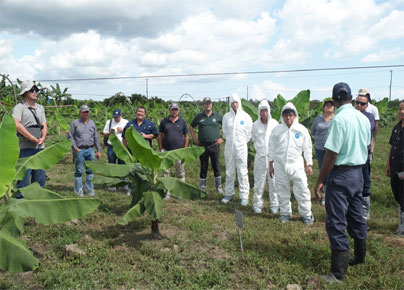Collaboration between Taiwan and Guatemala in Banana Production
2024-09-06

The Technical Mission of the Republic of China (Taiwan), in conjunction with the National Central School of Agriculture (ENCA) of Guatemala, has established an alliance to support the new tissue culture laboratory at this educational institution. This collaboration aims to promote the production of healthy banana seedlings to boost the banana industry in Guatemala. A team of researchers from Agrosavia, the Tibaitatá and Palmira Research Centers, the University of La Sabana, and the Earlham Institute in the United Kingdom has conducted an innovative study, which has been published in the journal G3: Genes, Genomes, Genetics.
This finding opens new opportunities to improve a crucial agricultural species for global food security. Bananas and plantains are essential crops in many tropical and subtropical regions, not only for their nutritional value but also for their economic importance. However, improving their productivity and quality has been a constant challenge due to their genetic complexity and disease susceptibility. This study is the first report of genes related explicitly to fruit quality and high productivity in Musa spp., representing a significant advancement for genetic improvement programs.
Using an association mapping strategy, the study identified molecular markers in the Colombian collection of Musaceae from the Plant Germplasm Bank, located at the Palmira Research Center. The researchers used two reference genomes: the A genome of Musa acuminata and the B genome of Musa balbisiana. This research identified 38 candidate genes in M. acuminata and 40 in M. balbisiana, associated with agronomic traits such as productivity, weight, number of fingers per bunch, and high Brix concentration.
Identifying these candidate genes is an essential advancement for genetic improvement programs. Once validated in the field, these molecular markers will allow early selection in nurseries of plants with high probabilities of presenting desirable characteristics. This will not only accelerate traditional improvement programs but also reduce the costs associated with the release of new varieties, thus meeting the needs of Colombian farmers. Agrosavia highlights that using molecular tools to improve bananas and plantains could significantly impact Colombia's agricultural production. Promoting the production of improved varieties is expected to improve farmers' quality of life and the country's food security. This work underscores the importance of biotechnology in modern agriculture and offers a roadmap for future research and practical applications in the study of Musaceae. Additionally, this biotechnological approach could be adapted to other important crops, expanding its impact and benefits.









